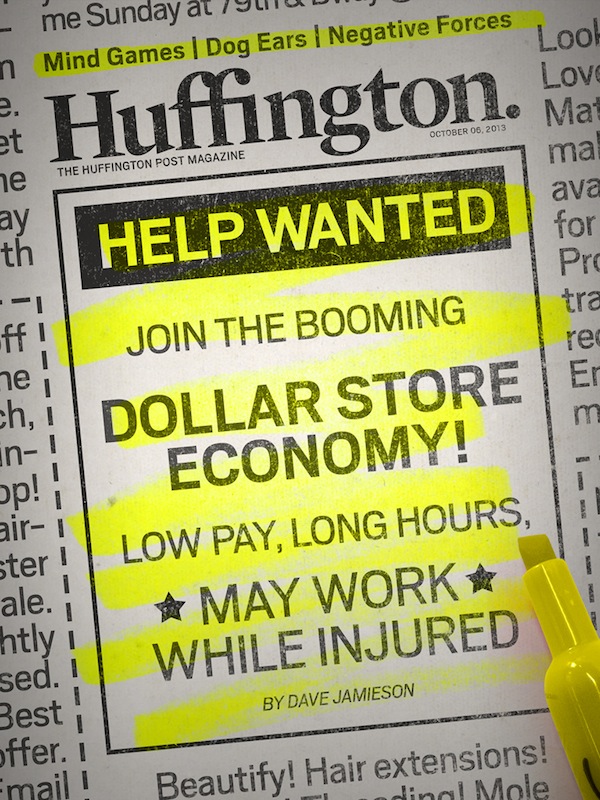In this week's issue, we take a close look at the booming dollar-store business, where the labor comes almost as cheap as the off-brand laundry detergent. A new dollar store opens every six hours in America. Unfortunately, the jobs they bring look to be some of the worst our economy has to offer.
Dave Jamieson speaks to dollar-store workers across the country, finding that the major players in the industry -- Dollar General, Dollar Tree and Family Dollar -- have grown their businesses by squeezing all they can out of their employees. The hours are brutal, the pay is low, and workers who happen to get hurt have a way of suddenly losing their jobs.
And those workers who rise to become dollar store managers too often find their lives become even more difficult as a result.
Dawn Hughey, a former Dollar General employee, told Dave that dollar-store managers work up to 80 hours a week but aren't eligible for overtime pay. Many supervisors are earning close to the minimum wage, doing everything from stocking shelves to manning the cash register -- at least until they happen to get injured.
That was the case with Wanda Womack, a Dollar Tree employee who was injured while lifting heavy boxes. She went on paid leave in order to have surgery, but her job came to an end shortly after she returned, because the physical demands of the job were just too much.
As Hughey puts it, "We're disposable."
Elsewhere in the issue, Bianca Bosker examines a growing body of research that shows our tendency to favor negativity over positive -- or more subtle -- emotions on social media.
"Negative comments are much more memorable and much more noticed," says Clifford Nass, a Stanford University professor of communications. "In a world where you're trying to get noticed, going negative is the way to go."
In a study published last month, a team at China's Beihang University found anger to be the most contagious emotion online, spreading faster than sadness, disgust, and even joy.
As Bianca puts it, "I hate, therefore I 'like.'"
In our Data section, we map out unintended pregnancies by state throughout America, which stands out in the industrialized world for its high rate of surprise births. Consider this: about half of the 6.7 million American pregnancies each year are unplanned.
We also introduce Dog Ears, a column spotlighting music from a range of genres and decades. And as part of our ongoing focus on the Third Metric, we present several ways to retrain your mind for more creativity, productivity, and fulfillment.
This story appears in Issue 69 of our weekly iPad magazine, Huffington, available Friday, Oct. 4 in the iTunes App store.

